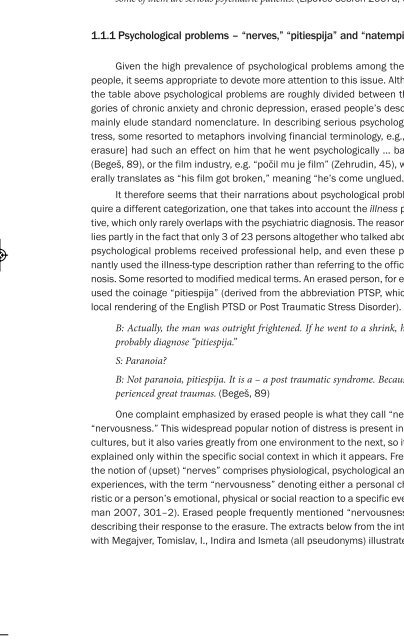The Scars of the Erasure_web
The Scars of the Erasure_web
The Scars of the Erasure_web
- No tags were found...
Create successful ePaper yourself
Turn your PDF publications into a flip-book with our unique Google optimized e-Paper software.
<strong>Erasure</strong>_4a 10.1.11 20:29 Page 163ERASED RIGHTS, INVISIBLE DISEASES163o<strong>the</strong>r parts <strong>of</strong> <strong>the</strong> body. I treated two erased people who had <strong>the</strong>ir legs amputatedas a result <strong>of</strong> narrowed veins. We also saw stomach diseases and serious disruptions<strong>of</strong> <strong>the</strong> central nervous system. In addition, many erased people who come to us havepsychological problems, ranging from various forms <strong>of</strong> psychosis to depression, whilesome <strong>of</strong> <strong>the</strong>m are serious psychiatric patients. (Lipovec Čebron 2007a, 64–65)1.1.1 Psychological problems – “nerves,” “pitiespija” and “natempiranost”Given <strong>the</strong> high prevalence <strong>of</strong> psychological problems among <strong>the</strong> erasedpeople, it seems appropriate to devote more attention to this issue. Although in<strong>the</strong> table above psychological problems are roughly divided between <strong>the</strong> categories<strong>of</strong> chronic anxiety and chronic depression, erased people’s descriptionsmainly elude standard nomenclature. In describing serious psychological distress,some resorted to metaphors involving financial terminology, e.g., “it [<strong>the</strong>erasure] had such an effect on him that he went psychologically … bankrupt”(Begeš, 89), or <strong>the</strong> film industry, e.g. “počil mu je film” (Zehrudin, 45), which literallytranslates as “his film got broken,” meaning “he’s come unglued.”It <strong>the</strong>refore seems that <strong>the</strong>ir narrations about psychological problems requirea different categorization, one that takes into account <strong>the</strong> illness perspective,which only rarely overlaps with <strong>the</strong> psychiatric diagnosis. <strong>The</strong> reason for thislies partly in <strong>the</strong> fact that only 3 <strong>of</strong> 23 persons altoge<strong>the</strong>r who talked about <strong>the</strong>irpsychological problems received pr<strong>of</strong>essional help, and even <strong>the</strong>se predominantlyused <strong>the</strong> illness-type description ra<strong>the</strong>r than referring to <strong>the</strong> <strong>of</strong>ficial diagnosis.Some resorted to modified medical terms. An erased person, for example,used <strong>the</strong> coinage “pitiespija” (derived from <strong>the</strong> abbreviation PTSP, which is <strong>the</strong>local rendering <strong>of</strong> <strong>the</strong> English PTSD or Post Traumatic Stress Disorder).B: Actually, <strong>the</strong> man was outright frightened. If he went to a shrink, he wouldprobably diagnose “pitiespija.”S: Paranoia?B: Not paranoia, pitiespija. It is a – a post traumatic syndrome. Because he experiencedgreat traumas. (Begeš, 89)One complaint emphasized by erased people is what <strong>the</strong>y call “nerves” or“nervousness.” This widespread popular notion <strong>of</strong> distress is present in variouscultures, but it also varies greatly from one environment to <strong>the</strong> next, so it can beexplained only within <strong>the</strong> specific social context in which it appears. Frequently,<strong>the</strong> notion <strong>of</strong> (upset) “nerves” comprises physiological, psychological and socialexperiences, with <strong>the</strong> term “nervousness” denoting ei<strong>the</strong>r a personal characte -ristic or a person’s emotional, physical or social reaction to a specific event (Helman2007, 301–2). Erased people frequently mentioned “nervousness” whendescribing <strong>the</strong>ir response to <strong>the</strong> erasure. <strong>The</strong> extracts below from <strong>the</strong> interviewswith Megajver, Tomislav, I., Indira and Ismeta (all pseudonyms) illustrate this:


